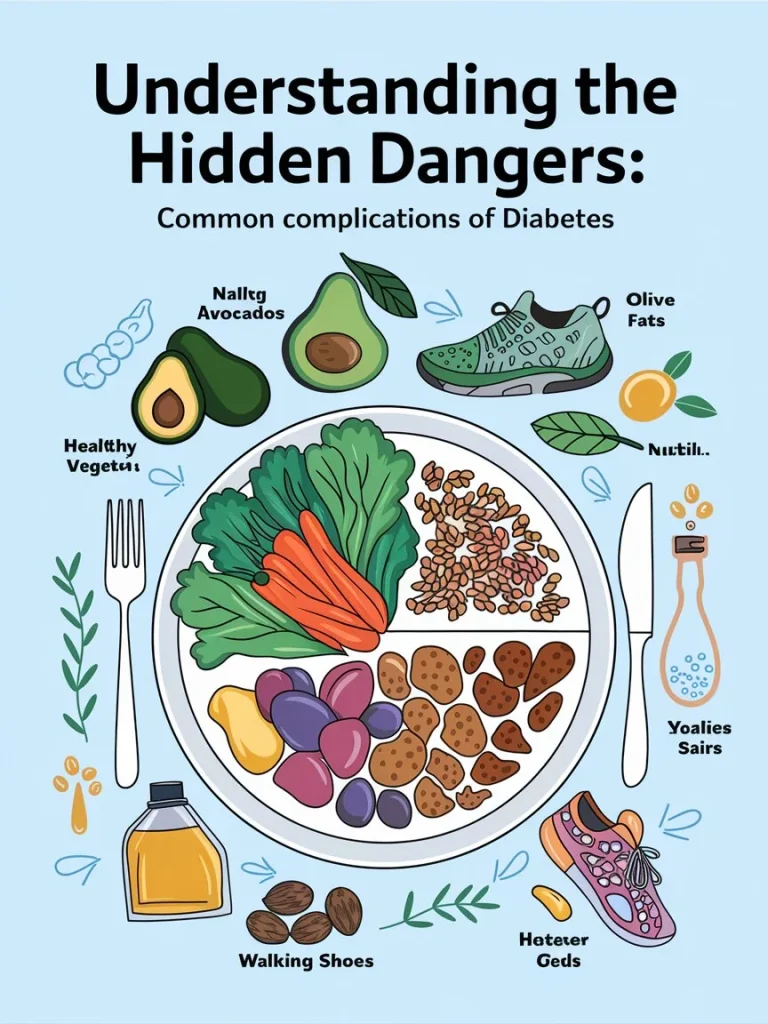Managing diabetes can often feel like walking a tightrope. You want to do everything right—from monitoring blood sugar to managing your diet—but there’s always a lingering worry about complications. Unfortunately, if you don’t take proactive steps, diabetes can lead to some serious health challenges.
But here’s the good news: with the right lifestyle and nutrition management, many of these complications can be prevented or at least minimized.
How Lifestyle and Nutrition Impact Diabetes Management
Your lifestyle and nutrition choices are key players in managing diabetes. In fact, they can significantly affect your blood sugar levels and overall health. The right diet can help stabilize your glucose levels, while regular physical activity can improve your insulin sensitivity.
Let’s dive deep into the practical steps you can take to navigate the complexities of diabetes, focusing on lifestyle and nutrition.
The Importance of a Balanced Diet
Eating a balanced diet is crucial for anyone, but for someone with diabetes, it’s essential for maintaining health and preventing complications.
Understanding Carbs and Their Impact
Carbohydrates have a direct impact on your blood sugar levels. It’s not about avoiding them altogether, but rather understanding how to choose and combine them effectively.
Focus on complex carbohydrates—like whole grains, legumes, fruits, and vegetables—these provide more fiber and nutrients, and they take longer to digest, resulting in a more gradual rise in blood sugar.
Quick Tip
Try the Plate Method: Fill half your plate with non-starchy vegetables, a quarter with lean protein, and a quarter with whole grains. This visual guide can help you portion your meals effectively and balance your nutrients.
The Role of Healthy Fats
Healthy fats, such as those found in avocados, nuts, and olive oil, can improve heart health, which is critical since diabetes can increase the risk of heart disease. Including these fats in moderation can help you feel full and satisfied, making it easier to stick to healthier eating patterns.
The Magic of Meal Timing
Regular meal timing helps regulate blood sugar levels. Having smaller, more frequent meals can prevent spikes and dips in your glucose levels. Aim for three balanced meals and a couple of healthy snacks throughout the day.
The Benefits of Regular Physical Activity
Exercise may sound daunting, especially if you’re already juggling diabetes management, but it’s one of the best tools you have at your disposal.
Exercising Safely
Finding activities you enjoy can make a big difference. Whether it’s walking, swimming, dancing, or cycling, aim for at least 150 minutes of moderate aerobic activity a week, breaking it into smaller sessions if necessary. Always check with your healthcare provider before starting a new exercise routine to ensure it’s safe for you.
Strength Training is Key
Don’t forget about strength training! Incorporating resistance exercises at least two days a week can improve insulin sensitivity and help maintain muscle mass, which is crucial as you age.
Managing Stress and Mental Health
Living with diabetes can be stressful, and stress can impact your blood sugar levels. Managing your stress through relaxation techniques—like deep breathing, yoga, or meditation—can not only improve your mental health but also your physical well-being.
Did You Know?
Mindfulness meditation may reduce the risk of complications by improving your overall emotional health, which in turn can lead to better diabetes management.
Building a Support Network
Connecting with others—whether it’s friends, family, or a diabetes support group—can provide emotional support, motivation, and shared experiences. Don’t hesitate to reach out; you’re not alone!
Strategies for Success
Adopting healthy lifestyle habits involves creating a structured plan that works for you. Here are some actionable strategies:
-
- Keep a Food Diary: Track what you eat, along with your blood sugar levels. This can give you insights into how different foods affect your glucose.
-
- Plan Your Meals: Consider weekly meal prepping to ensure you have healthy options readily available. This reduces the temptation of grabbing quick, unhealthy snacks.
-
- Stay Hydrated: Drink plenty of water throughout the day. Sometimes thirst can be mistaken for hunger.
-
- Weekly Goals: Set small, achievable goals each week. It could be cooking one new healthy recipe or taking a 10-minute walk each day.
-
- Regular Check-ups: Keep up with your doctor appointments. Regular monitoring of your A1C levels, blood pressure, and cholesterol can catch potential complications early.
Frequently Asked Questions (FAQ)
Q: What should I avoid eating with diabetes?
A: Try to limit refined carbs, sugary snacks, and drinks, and saturated fats. Focus on whole foods instead.
Q: Can I still enjoy desserts?
A: Yes, moderation is key! Opt for healthier dessert options, like fruit or yogurt, or enjoy a small portion of your favorite treat occasionally.
Q: How often should I check my blood sugar?
A: This can vary by individual. Consult your healthcare provider for a personalized plan.
Q: Is exercise really that important?
A: Absolutely! Regular exercise can help you control your blood sugar, lower your risk of heart disease, and improve your overall health.
Conclusion
Understanding the potential complications of diabetes doesn’t have to add to your stress; it can be a call to action! By adopting a healthy lifestyle and making informed nutrition choices, you’re investing in your long-term well-being. Remember, every small step counts—whether it’s a balanced meal, a brisk walk, or simply a moment of mindfulness. Don’t hesitate to reach out for support and celebrate every achievement, big or small. Your journey to managing diabetes can lead to a fulfilling life full of possibilities. You’ve got this!

